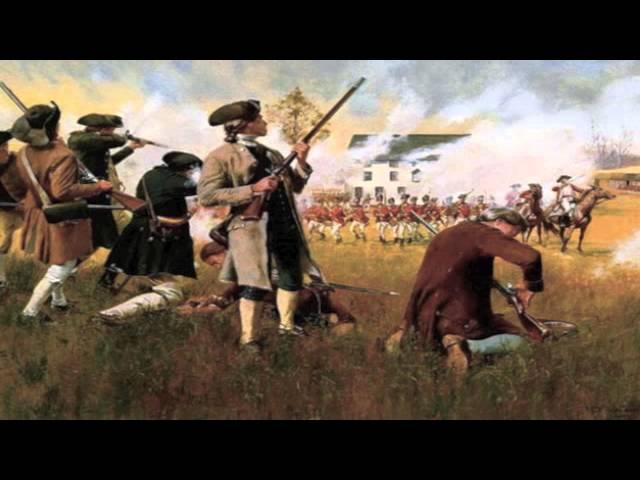Комментарии:

The Tet Offensive WAS NOT a military defeat for the American military. The U.S. forces and our South Vietnamese allies WERE initially caught off guard by the well coordinated surprise attacks (which violated a cease fire that had been agreed to by both sides every year during the Tet celebrations) which were launched by the largest North Vietnamese Army (NVA) formations so far engaged in the conflict and supported by most of the then active Vietcong units who were able to quickly make significant tactical gains throughout the entirety of South Vietnam; virtually seizing many critical towns [including the ancient historical capital of Hue (pronounced like whey)]. However, our forces were able to regroup and counter-attack in relatively short order. While the fighting to throw back the NVA and Vietcong forces was certainly tough and resulted in significant casualties, in every single case our troops were able to retake all of the lost territory while annihilating much of the enemy formations. The toll inflicted on the NVA kept their leadership from launching any more large scale offensives into the south until after the U.S. had withdrawn our military commitment from the theater. The only respect in which the Tet Offensive could be assessed as a NVA victory and an American defeat was in the realm of public opinion on the home-front.
Ответить
Add battles like Pavia, Rocroi, Bouvines (maybe the most important battle in the history of Engalnd and France), Nancy, Plassey, and a few dozen in china and india. I only really know europaen history, but those are all more important than most of what you have here. If the also waterloo was not that important, but Ulm, and Jena-Auerstedt changed how we think about warefare. Also malplaquet, and Valmy were massively important, more so than 90% of your list.
Ответить
Seige is pronounced "seej,' not "sage." I thought everyone knew that.
Ответить
I think that "25 most well-known battles in USA" would have been a better title.
Ответить
1. Battle of Manzikert
2. Siege of Constantinople
3. Battle of Tours
4. Siege of Vienna
5. Battle of Ain Jalut

It was the second siege of Vienna of 1683 which led to the decline of the Ottoman Empire, not the first siege of 1529. In fact, Ottomans in the early 1500's were busy conquering territories in North Africa, even after the Ottomans failed to capture Vienna in 1529.
Ответить
Why would you choose Thermopylae over Marathon?
Ответить
wrong info on tet.
Ответить
So.... WW1 meant nothing even though it was the first truly modern warfare
Ответить
Aside from the fact that you mispronounced the names of at least half of these battles, you are dead wrong about the last one in almost every way.
The Tet Offensive was a Communist victory only in the sense that it was perceived as such in the United States and reported as such by the American media. As a result, support for the war at home collapsed and it became politically impossible not to begin the process of disengaging ourselves. But from a military point of view, it was a crushing defeat not for the United States, but for the Communists. Their losses were catastrophic and the Viet Cong ceased to exist as a viable fighting force because of the attrition they suffered during Tet. From that point on the North Vietnamese army had to essentially take over the war. The offensive not only failed but failed disastrously. Militarily, what you present as a defeat for the United States was, in fact, a resounding victory.
But it was a crushing political defeat even so because of the spin the American media put on it. The American people never realized that from a military point of view we were the winners of the battle, and the Communists were the losers. The media ignored the fact that the offensive was crushed and presented the fact that it happened at all to the American public as proof that we couldn't win the war. The result was that a catastrophic military defeat for the other side became the political victory which won them the war. What they failed to win on the battlefield was gift-wrapped for them in the American newsroom.

Very good overall, with a few mispronunciations of several place names, eg. The Battle of Antietam: 1862, 'ant-EE-tam', not ANT-ee-tam.
Ответить
Inaccurate, poorly presented and the narrator seemingly has never heard the word SIEGE before. You really should pull this one. It's embarrassing.
Ответить
Where is de raid from 1667 on the royal navy by michiel de ruyter
Ответить
Please, please, please.... Learn how to pronounce things before you make these lists. TRA-fal-gar? It's Tra-FAL-ger. Siege is is pronounced SEEJE.
Ответить
Pronunciation is frightening. Many factual errors and misleading statements.
Ответить
The narrator's pronunciation is terrible 🙈😕
Ответить
Siege is pronounced "seej".
Ответить
Tet Offensive ? Why ? The battle isVERY decisive for that war and for USA. But it's not important for World History.
Where are battles from WW 1 ?

Polish-Soviet war, year 1919: Defend of Warsaw and not allowing to spread Comunism to Europe
Ответить
The Tet Offensive was not a NVA victory. The American and ARVN forces defeated the NVA, militarily. The American defeat was a political one. Also, learn to pronounce the names correctly.
Ответить
What about cartagena de indias ?
Ответить
Leipzig should be higher than Waterloo..
Ответить
The English Civil War is a misnomer & should be called the British Civil Wars.
Ответить
The battle of Lexington=the battle of Concorde.The British attack in the battle was successful & they destroyed the armory.
Ответить
The Battle of Britain was not won by the Royal Air Force,solely.
Ответить
As A battle can be any fight,you can call the atom bomb ops as battles.
Ответить
and what about Bouvine 1214?
Ответить
You dont know a history
Ответить
Dude its antietam an-tee-tum. Not an-tan-tan. You can't teach if you don't know
Ответить
Yeah, you put all the most useless battles of england and usa. I could do the same shit with my own country if I want:
- Battle of Alesia
- Battle of Fontenoy
- Battle of Rocroy
- Battle of Verdun
- Battle of Normandy
- Battle of the Somme
- Battle of Austerlitz
- Battle of Iena
- Battle of Arcole
- of Bouvines
- of Orleans
- of Poitiers
- of Eylau
- of Rivoli
- of Valmy
- of Marengo
- Wagram
- Marignan
- Chateau Gaillard’s siege
- Battle of Tournai
- Strikes in syria ( lol )
- Friedland
Ect

Good american centralized video, you sucker!
Ответить
No Battle of Warsaw?
Ответить
More accurate will be " battles that changed WESTERN history"
Ответить
Stalingrad my dudes, finally someone gets it.
Ответить
also valmy
Ответить
Grunwald 1410 the biggest medieval battle. The battle shifted the balance of power in Central and Eastern Europe and marked the rise of the Polish–Lithuanian union as the dominant political and military force in the region.
Ответить
Vienna 1683 Christian Europe Repels the Ottomans.
Ответить
No battle of warsaw?
Ответить
battle of Stalingrad couldn't be compared to any of other battles.........no comments
Ответить
An-tee-tum sound it out
Ответить
No “Battle of Diu”? Just the most important naval battle in Human history!!
If the Portuguese were defeated by the Muslims everything would be different from the XVI Century onwards...

Battle of teutoburg??
Ответить
Need to know how to actually pronounce the names of the battles you're talking about
Ответить
I seen world war 2 in book
Ответить
Clontarf 1014
Ответить
Battle of Warsaw (1921) if Poland lost, Soviets can occupy World before WW2 because Germany was almost without army, British,French,American was tired of WW1
Ответить
Battle of Diu saw europeans and ottomans come together to win against the Portuguese on the other side of the world. The decisive portuguese victory meant that the ottoman empire couldnt expand into the indian ocean, cutting a lot of its revenue from the spice trade. It was way more important than the siege of viena for example.
Ответить
This list is Garbage
Ответить
My Choices for the Most Influential Battles in World History by Rank:
1. Battle of Djahy
2. Battle of Gibeon
3. Battle of Edington
4. Battle of Badr
5. Battle of Marathon
6. Battle of Silva Arsia
7. Battle of Cannae
8. Battle of Tours
9. The Siege of Toulon
10. Battle of Trafalgar
11. The Battles of Saratoga
12. Battle of Antietam
13. The First Battle of the Marne
14. The Siege of Stalingrad
15. Battle of Hastings
16. Battle of Gaugamela
17. Battle of Cajamarca
18. Battle of Myeongnyang
19. Battle of Muye
20. Battle of Boyaca
My Top 20 Most Influential Battles in World History in Chronological Order:
1 - Battle of Gibeon [around 1400 B.C.](assuming the account is accurate): Secured the Israelites' hold in the land of Canaan to begin establishing the Kingdom of Israel, laying the seed for the advent of Christianity and their conflict with the Muslims for the past 1,400 years.
2 - Battle of Djahy [1178 B.C. or 1175 B.C.]: The most important land battle during the Late Bronze Age collapse, and was most pivotal in defeating the Sea Peoples who had destroyed the Mycenaeans, the Island of Cyprus, the Hittites, and greatly diminished Assyria causing virtually every city from modern day Italy to the Suez Canal to be abandoned or destroyed. If Egypt had fallen to the Sea Peoples, it's possible a greater power could have been established. The Sea Peoples were most dominant at sea, and so would have dominated the Mediterranean coastline because every major power was destroyed, and they would have as much as a few hundred years to establish themselves before Assyria could become a significant foe. The Sahara desert would also make it difficult to defeat them on land. Possible effects of this would be the prevention of the rise of the powers of the Romans, Carthaginians, and Greece. So no Punic Wars, Roman Empire, or Greek philosophy or Democracy.
3 - Battle of Muye [1046 B.C.]: The decisive defeat of the Shang Dynasty by the Zhou Dynasty. The Zhou Dynasty was the longest lasting Dynasty in Chinese history at 789 years. They established the concept of the "Mandate of Heaven" and justification for power. Developed Chinese writing almost into its modern form. Established feudalism in China to rule a large area more efficiently, enabling a unified Chinese culture to spread across all of modern day China and other parts of Asia. A more Balkanized China could have been totally dominated by Western Colonial powers similar to how the British Empire ruled India, and China wouldn't be the great regional power it us today.
4 - Battle of Silva Arsia [509 B.C.]: Established the Roman Republic, and the form in which they would conquer others and turn them into allies by treaty. These alliances were made so strong that it provided Rome with a near inexhaustible supply of reserves for their army which enabled them to survive several times the loss of their entire army against Hannibal during the Second Punic War.
5 - Battle of Marathon [10 September 490 B.C.]: The first time the Greeks had beaten Persia. Marks the beginning of the Golden Age of Greece and the foundation of the culture of the modern Western world.
6 - Battle of Gaugamela [1 October 331 B.C]: It secured Alexander the Great's victory over the Persians and spread the influence of Greek culture all the way into parts of India.
7 - Battle of Cannae [2 August 216 B.C.]: Caused the Romans to change the way they fought entirely, enabling them to dominate the Mediterranean coastline and most of Europe.
8 - Battle of Badr [13 March 624 A.D.]: Established the Muslims as a rising power, and was the first offensive action to form what would become the Caliphate. Brought the world algebra, increased understanding of the eye and contributed largely to the discovery of cancer to name a few.
9 - Battle of Tours [10 October 732 A.D.]: Denied expansion of the Umayyad Caliphate into the Kingdom of the Franks, largely being credited with saving the Christian world.
10 - Battle of Edington [May 878 A.D.]: Secured the foundation for the rise of England and eventually the British Empire, which has invaded around 90% of the countries of the world in its history. Also, it is responsible for ending slavery throughout most of the world, a concerted effort lasting centuries.
11 - Battle of Hastings [14 October 1066 A.D.]: Ended Anglo-Saxon rule of England, helped create the modern English language, and established the conditions that caused the Hundred Years War 271 years later.
12 - Battle of Cajamarca [16 November 1532 A.D.]: Started the end of the Inca Empire. It was the only place in history to practice a Communist style economy that actually succeeded, and wasn't the cause of millions of innocent lives being slaughtered or starved. They had accomplished which was attempted numerous times in the 20th century that all failed miserably. If the Inca model still existed and was largely copied, then it could have prevented the deaths of tens of millions of innocent people all over the world. It was indeed a great loss to humanity.
13 - The Battle of Myeongnyang [26 October 1597 A.D.]: Stopped the land army of Japan from taking over the whole of Korea by stopping them from receiving reinforcements and supplies. Convinced the Chinese to send their navy, and ultimately forcing the withdrawal of Japan's army from Korea. Basically it prevented the Japanese Empire from being able to expand centuries before WW2. The defeat of Korea would also have allowed the Japanese Empire to greatly increase their naval power using Korean technology, with which they could have dominated the whole of the coastline of China.
14 - The Battles of Saratoga [19 September and 7 October 1777 A.D.]: Convinced the French to join the fight of the American Revolution against the British making the victory at Yorktown possible and ultimately leading to the establishment of the world's first superpower, the United States of America.
15 - The Siege of Toulon [29 August to 19 December 1793 A.D.]: It was the first real opportunity for Napoleon's strategic prowess to start being recognized. A defeat would have hurt his chances to move up the ranks. Also, Toulon was important enough for France that losing it could have lead to a failed French Revolution that wouldn't provide enough time or opportunities for Napoleon to prove himself and make any significant difference.
16 - Battle of Trafalgar [21 October 1805 A.D.]: Prevented from being able to invade the Island of Great Britain. The invasion of Russia nor the campaign in Spain would have occurred. The French Empire would have been solidified as the master of all of Europe.
17 - Battle of Boyaca [7 August 1819 A.D.]: Battle that paved the way for all of the Northern part of South America to gain independence from Spain. That area includes the countries today of Columbia, Venezuela, Peru, Ecuador, and Bolivia.
18 - The Battle of Antietam [17 September 1862 A.D ]: Prevents the Confederacy from attacking Washington DC in the American Civil War, and gave President Lincoln the confidence to issue the Emancipation Proclamation, changing the ultimate goal of the war from preserving the Union to freeing the slaves, renewing Union morale. Any foriegn power thinking of intervention on behalf of the Confederacy would be unable to do so any longer due to the political ramifications that would happen because of the Emancipation Proclamation.
19 - The First Battle of the Marne [5 to 12 September 1914 A.D.]: Disrupted the Schlieffen Plan of the Germans in WW1 and forced Germany intoa two-front war. If it succeeded WW2, at least, wouldn't happen the same if it did at all. Hitler wouldn't rise to power because there's no Treaty of Versailles to cause absolutely crushing economic problems as happened to the Weimar Republic after the abdication of the Kaiser.
20 - Battle of Stalingrad [17 July 1942 to 2 February 1943 A.D.]: Had the Germans won, then the most important supply line to the Soviets through the Volga would be cut off, the Soviet Union would collapse, and Germany would capture control of the oil in the Caucasus. The Allies possibly could have been facing a million more soldiers on D-Day because of the soldiers that would be freed from the Eastern front. D-Day would have been a massacre on the beaches, as the whole European coastline would have been able to be much more heavily fortified and manned.



























